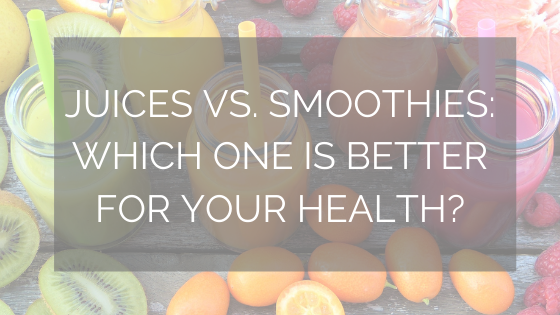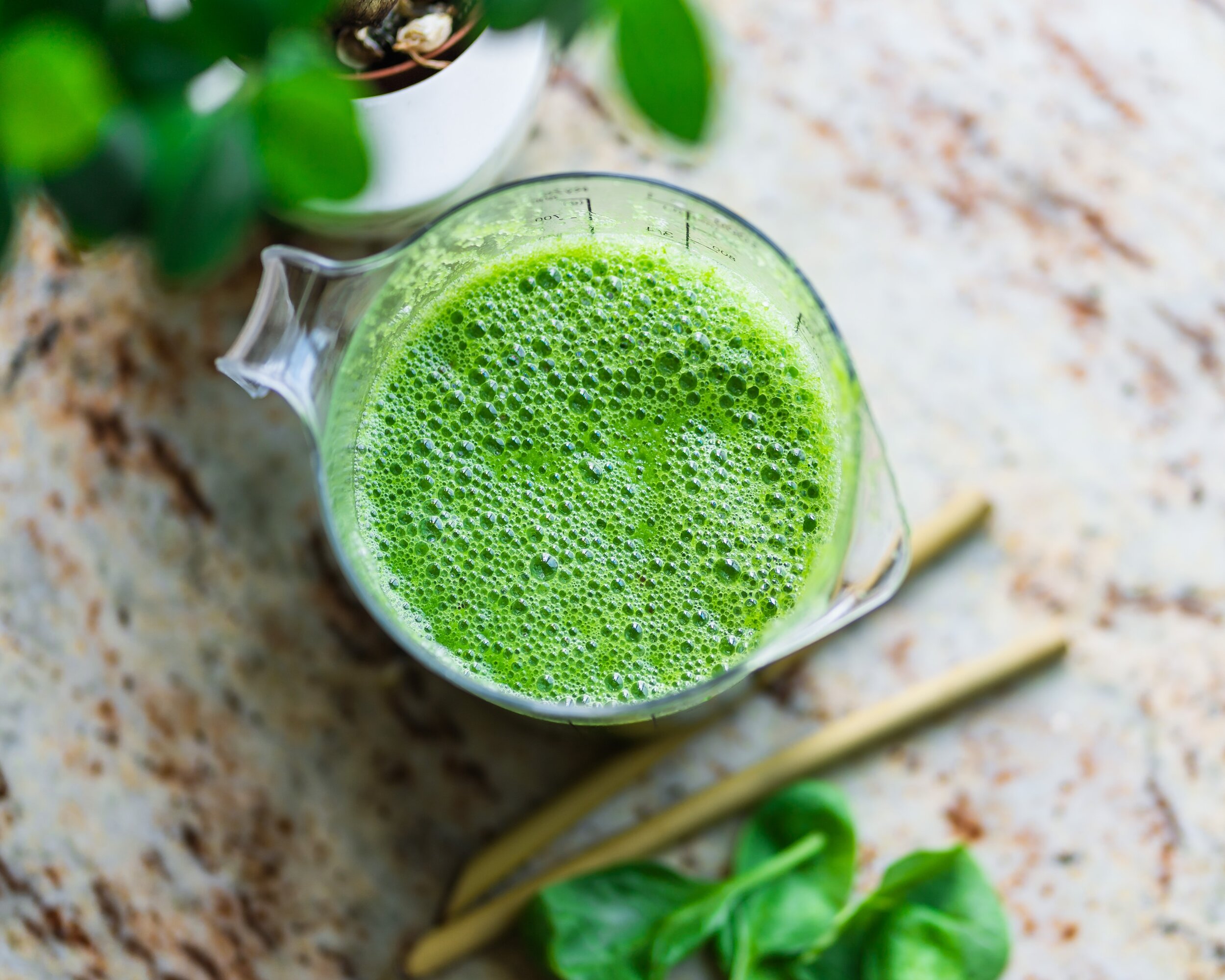Written By Hannah O’Shei, PNW Intern, Spring 2021
Both juices and smoothies have become thought of as a “must have” in the health and wellness world. Influencers even go as far as to say that certain combinations of juices or smoothies can cure illnesses, treat health issues, boost the immune system, help you lose weight, or cleanse and detox the body. In this blog post, I will explain the difference between juices and smoothies, go over the pros and cons of each, and dig a little deeper into some of the health claims about juice cleanses.
Juices
Juicing is a process that removes the pulp and skin from a fruit or vegetable while extracting the juices. The juice that’s leftover contains mostly water, sugar and some vitamins, minerals, and antioxidants. However, when we juice fruits and vegetables we lose many of the nutrients inside that would be found in the skin and pulp like dietary fibers and proteins. It’s also important to note that many of the vitamins, minerals, and antioxidants are contained within the skin and pulp meaning the nutrient content as a whole is going to decrease through the juicing process.
Pros
Juice can be tasty and satisfying and does contain some vitamins, minerals, and antioxidants. Juice can also be a good source of extra calories and fluids for someone who's sick or experiencing nausea.
Cons
Juice lacks important dietary fibers found in whole fruits and vegetables - vitamin, mineral, and antioxidant content is also lowered. Juices are high in sugar and calories so consuming juice in excess can cause weight gain and blood sugar spikes. Juicing can be an expensive hobby to pick up - organic cold pressed juices can cost as much as $10 per serving and a quality juicer can cost anywhere from $100-$1000. Unpasteurized juice has a short shelf life and has the potential to grow harmful bacteria (side note: it is not recommended for pregnant women to consume unpasteurized juice due to this). Most of the health claims made about juices are not evidenced based.
Smoothies
Smoothies are usually made by blending together fresh or frozen fruits and vegetables with a liquid (ex: plant-milk, fruit juice, coconut water, etc). Oftentimes people add things like protein powder, liquid supplements, seeds, yogurt, nut butters, and more. Smoothies can also be made with fruit purees and concentrates instead of whole fruit and offer little to no fiber or protein - this is why it’s good to watch out for smoothies being sold at restaurants or fast-food places. For example, the Dairy Queen Mango Pineapple Premium Fruit Smoothie contains a whopping 55g of sugar and only 1g of fiber in one serving! Yikes.
Making smoothies at home however can be a nutritious and filling snack. Since smoothies are blended and not juiced, they have more fiber and other nutrients. Plus, you can throw in seeds, nut butters, protein powders and other add-ins to provide more healthy fibers, proteins, and fats.
Pros
Smoothies are tasty and satisfying. They can be a great way to get in extra calories, protein, or other nutrients if you are struggling to meet your needs. Smoothies can also make a well-rounded snack - my favorite combination is frozen bananas, berries, soy milk, peanut butter, and hemp seeds. Smoothies made with whole fruits or veggies also contain dietary fiber which can help with blood sugar control and is beneficial for gut health. Smoothies can also be a healthy and delicious way to satisfy a sweet tooth - like this delicious Chocolate Peanut Butter Shake!
Cons
Not all smoothies are created equal - smoothies can be made with added sugar, purees, and artificial flavorings and have little to no real fruits or vegetables, fiber, protein, or healthy fats. This is why buying smoothies from restaurants and fast food joints should be met with caution. Most smoothies are also not high enough in calories to be considered a full meal - drinking smoothies as a meal replacement could lead to irritability, fatigue, and binge-eating. Price is another potential con since purchasing pre-made smoothies can be expensive and cost anywhere from $5-$10 per serving.
Juice Cleanses
Juice cleansing is a fad diet where you consume only juice for a short period of time, usually 1-3 days. Many claim that juice cleanses can boost your immune system, facilitate weight loss, increase your energy, detox and “reset your body”. However, there is no evidence to support these claims. Adding more whole fruits and vegetables to your current diet is a better, more cost effective way to consume vitamins, minerals, and antioxidants. We also know that juice is high in sugar and low in fiber, protein, and fat so switching to a juice only diet could have serious repercussions on the body like irritability, diarrhea, fatigue, nutrient deficiencies, and also can put you at a higher risk of developing disordered eating behaviors.
What about Detoxing?
There are also claims that juice cleanses can help detox the body. Detoxing is the process of removing excess waste products and toxins from the body. However, there isn’t a food or beverage out there that can detox your body for you. Our body is equipped with a detox system of its own through the skin, respiratory system, immune system, intestines, liver and kidneys. All of these systems work together to help rid the body of potentially harmful substances before they build up and cause damage.
Bottom Line
We know that eating more fruits and vegetables is associated with numerous health benefits and can lower our risk of chronic diseases like cancer, diabetes, and heart disease. Juice, however, should never be a replacement for whole fruits and vegetables in the diet. Juice is high in sugar and has little to no protein, dietary fiber, or fat which we need to get from whole food sources. The process of juicing also reduces the vitamin, mineral, and antioxidant content from fruits and vegetables and can also be costly to make. If you do enjoy drinking juice I suggest drinking it in moderation which would be around 6-8 oz. per day of 100% juice. Smoothies on the other hand can be a great way to get more fruits and vegetables into the diet because the fiber and nutrients remain in the final product. In addition, adding fortified plant milks, nut butters, and seeds to smoothies can make them a quick, balanced and nutrient-dense snack - perfect for people who are on-the-go. Juices and smoothies can both be part of a healthy and balanced diet. Taste preference, energy & nutrient needs, health concerns, and budget are all important factors when determining if adding juices and smoothies is right for you.








